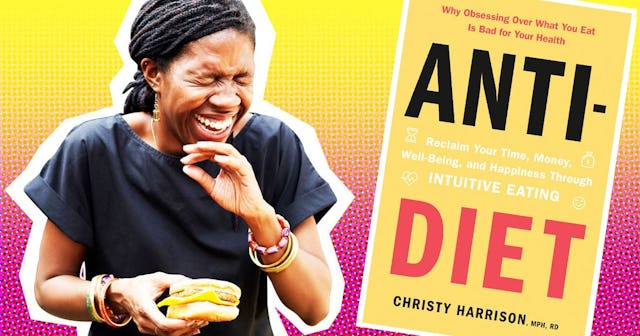The Anti-Diet Movement Is Transforming What It Means To Be Healthy

If you’re a woman, you’ve probably done it. Dieted, I mean. According to Live Strong, 50% of American women are on a diet at any given time. 90% of teens diet regularly. 50% of kids have tried a diet at one point. Low-carb, no-carb (which made my hair, and a friend’s hair, fall out, by the way), various corporate programs, Atkins, South Beach, keto … you know them all. Clean eating. But there’s a new trend, and it’s rising. It’s called the anti-diet. And we are so here for it.
Christy Harrison, an anti-diet registered dietitian and certified intuitive eating counselor, host of the podcast Food Psych, and author of the forthcoming book Anti-Diet: Reclaim Your Time, Money, Well-Being, and Happiness Through Intuitive Eating, explains what the whole thing means. She says we need to escape the belief that thinness equals moral and healthy well-being, promotes weight-loss as higher status, demonizes certain foods, and oppresses people who don’t meet the perfect standards all these things impose on them.
Anti-diet, she says, means, “anti–diet culture. It means standing against this oppressive system, in all its sneaky, shape-shifting forms”: from schools telling kids they need to lose weight and move more to your mother-in-law bitching about her need to lose weight.
Anti-diet, she says, does “not mean anti-health.”
According to Vice, the anti-diet movement, while popularized by some recent books, really has its roots in the radical fat-acceptance movement of the 1960s and was “borne out of radical feminism in the Bay Area of California amongst queer, Black, radical fat women.” The movement started with Susie Orbach’s Fat is a Feminist Issue breaking new ground in 1978, but nowadays, the anti-diet books have become a genre of their own, with Bee Wilson’s This is Not a Diet Book: A User’s Guide to Eating Well coming out in 2016. Both of these explicitly tie dieting to a feminist agenda: they “link between psychological needs and food habits.” Most new anti-diet books take their inspiration from there.
But anti-diet books have now become their own genre, says Vice, partly thanks to the body positivity movement and the general cultural movement against the whole wellness movement. Anti-dieting is about more than just eating what you want. In fact, Pixie Turner’s No Need to Diet book deals with issues like othorexia (obsession with eating healthy within a highly prescriptive rules), emotional eating, and health beyond nutrition. A working nutritionist, she says she “sees her book as more than just a collection of healthy dietary tips – it’s a radical act,” according to Vice.
And this radical anti-diet approach tells women to eat what they want. Eve Simmons, author of Eat it Anyway, says, “There is literally nothing out there that is just common sense and nutrition … telling people the facts and the science and letting people make their own minds up based on that, rather than this trendy bollocks.”
https://www.instagram.com/p/BzGurbXl0vU/
In other words, the real science behind dieting has been obscured by cultural pressures to look a certain way, by dieting advice from “twenty-two year-old models,” and by a toxic culture that prescribes the way women should act and eat,” says Vice.
Are you ready for this? Because we are so ready for this.
Women are so used to being told what to do, how to do it — from parenting manuals to Marie Kondo-ing to healthy living — that dieting has become one more prescription. One more answer. One more way in which we’re controlled.
While “both anti-diet and traditional diet books promise to revolutionise how you think about food, whether by helping you to eat onion rings without feeling guilty,” says Vice, anti-diet books are radically different. They promote intuitive eating: eat what you want, but eat only until you’re full. Listen to your body. But this can’t be a sound bite or explained in two sentences or less. It’s more nuanced than that. If you’ve dealt with an unhealthy relationship with food for decades, you may need counseling to get over it. You may need time with an anti-diet nutritionist like Harrison. And while these books are all written almost exclusively by thin white women, they say they’re meant for “everyone.”
https://www.instagram.com/p/BzEUCGKBno9/
This is kind of hard to swallow.
However, anti-diet focuses on behavior rather than weight loss, a refreshing break from the prescriptive nature of most dieting books, which are all “eat this instead of that.” (I once saw a keto book that advised me to make a pizza out of cheese on cheese, and I nearly wept in despair). Shape calls an anti-diet “the healthiest diet you can be on … It’s about making peace with food, not giving it the power to control your daily life, and cutting yourself a break when you eat what you’re craving.”
If you want to jump in the deep end of the anti-diet movement (and we hope you do), here are some book recommendations:
– Caroline Dooner, The Fuck It Diet: Eating Should Be Easy
– Eve Simmons and Laura Dennison, Eat It Anyway: Fight the Food Fads, Beat Anxiety and Eat in Peace
– Ruby Tandoh, Eat Up
– Laura Thomas, Just Eat It
– Pixie Turner, The No Need To Diet Book: Become a Diet Rebel and Make Friends with Food
Go forth, friends, and eat the food you love.
This article was originally published on